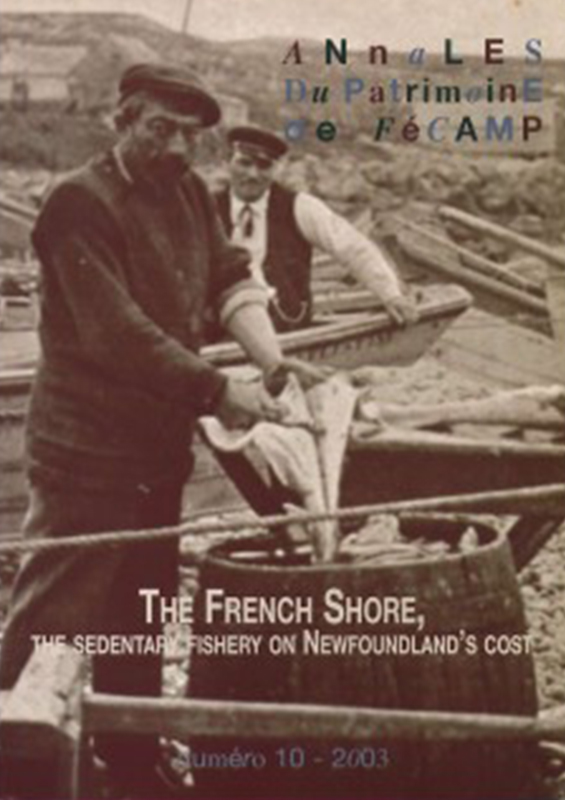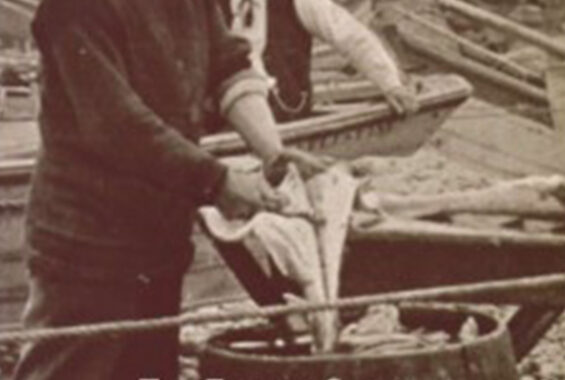
Annales N°10 / 2003 (English)
Contents
Special issue : The French Shore 1713-1904
Sedentary fishing on the French Shore coast in Newfoundland
- THE INTERNATIONAL PRESENCE IN NEWFOUNDLAND IN THE 16TH CENTURY
par Jacques Levêque de Pontharouart - THE PETIT NORD IN THE SEVENTEENTH CENTURY AND THE TRANSATLANTIC FRENCH FISHERY
by Peter E. Pope - ANGLO-FRENCH TREATIES AND THE FRENCH SHORE
by James Hiller - VOYAGE À TERRE-NEUVE (1847)
by C.J.A. Carpon (Extracts) - GOBINEAU'S VOYAGE À TERRE-NEUVE AND THE FRENCH SHORE QUESTION
by Roland Le Huenen - DESCRIPTION OF THE "MI'KMAQ (MICMAC) MAN
by Count Arthur De Gobineau (Extract) - CAPTAIN GEORGES-CHARLES CLOUÉ : 19TH-CENTURY HYDROGRAPHIC SURVEYOR
by Edward Tompkins - JULIEN THOULET ABOARD THE CLORINDE IN 1886 TRAVELS IN NEWFOUNDLAND
by Scott Jamieson - PAUL-ÉMILE MIOT SAILOR AND PHOTOGRAPHER IN NEWFOUNDLAND ICONOGRAPHY OF THE FRENCH SHORE
by Yves Leroy - THE FRENCH SHORE A FRENCH COAST IN NEWFOUNDLAND
by Jean-Pierre Martin - WITHOUT VISIBLE MEANS : THE NEWFOUNDLAND GARDENS ON THE FRENCH SHORE
by Ronald Rompkey - THE "NEWFOUNDLAND DOCTORS" OF THE FRENCH SHORE
A STORY WAITING TO BE TOLD
by Jean-Pierre Castelain - MARITIME ASSISTANCE FROM THE POINT OF VIEW OF MEDICAL CARE AND THE FIGHT AGAINST ALCOHOLISM
by H. Lugand (Extract) - THE ST. MALO FISHERY AND THE END OF THE FRENCH SHORE
by Yves Duboys Fresney - PETITS PÊCHEURS ? INSHORE FISHERMEN FROM ST. PIERRE ET MIQUELON ON THE FRENCH SHORE
by Francoise Enguehard
Leader
It's now a hundred years, 1904-2004, since under the terms of the Treaty of London, April 8, 1904, France abandoned the fishing rights it had held on the French Shore since the Treaty of Utrecht in 1713. For French outfitters, a chapter of the great maritime adventure of the cod fishery had come to a close. Four centuries of French presence on the shores of Newfoundland came to an end amid almost total indifference; since the beginning, France's maritime history has been marked by so many similar withdrawals.
By the end of the nineteenth century, the disinterest among outfitters in France for the Newfoundland cod fishery was already evident. The time was long gone since the days when lots were drawn at St. Servan every five years to determine who was entitled to what bay or fishing harbour on the west coast of Newfoundland, where boats from St. Malo and Granville carried on the shore-based or "sedentary" fishery.
Though the port of Fécamp was not directly affected (its boats were involved instead in the banks fishery), passions were nonetheless roused by the gradual withdrawal from the harbours and bays considered by cod fishermen to be their territory. Thus, in 1898, in an act of solidarity, the citizens of Fécamp attempted "a great coup, so that [they] would not be definitively driven out of those valuable places where [they] longer go", and a small, three-masted fishing boat was purchased in the neighbouring port of St. Valery-en-Caux and fitted out. The intent was that this boat, manned with a good number of sailors, would be seen all around the bays of the French Shore and, in order to occupy the terrain, "a trim little house of wood [would be built] measuring eight metres long by four meters wide, easy to take down, flying the French flag to show that the French are still there; the house was prefabricated at the sawmill in Touzet".1 As for the sailors, they fished whelks and perhaps some cod fish. Of course, the allowance granted by the French government to ships engaged in the cod fishery was not overlooked. It was an unusual and quite pointless gesture. What could such an isolated act have accomplished? As we have seen, the French Shore was indeed abandoned.
One hundred years after the abandonment, the French-speaking community of Newfoundland and Labrador has not forgotten; commemorative ceremonies are being held on both sides of the Atlantic. Again, though Fécamp never sent boats to the sedentary fishery; the Association Fécamp Terre-Neuve, whose objective is to maintain ties between this great cod-fishing port and those of Newfoundland and its region, has rightfully marked this anniversary by devoting a special edition to the history of this maritime adventure that is so poorly understood in France.
Moreover, this special edition of the Annales du patrimoine de Fécamp is the anniversary issue of the journal, celebrating its tenth birthday with contributions from authors from the other side of the Atlantic. This has been made possible thanks to the participation of the Canadian Embassy and the Societé 2004 Society. We would like to express our thanks to Françoise Enguehard and Ronald Rompkey, two strong defenders of the project on their side of the Atlantic. Thanks to them, Fécamp's contribution to the celebrations "of the French fact in Newfoundland and Labrador" has taken the form of a publication in both French and English, the first tangible sign of a solid link with Newfoundland and Labrador and St. Pierre and Miquelon. Let us hope that others will follow !
1. Léopold Soublin, Cent ans de pêche à Terre-Neuve. 1991
Complétez votre collection !
Pour compléter votre collection, profitez de notre #OFFRE DÉSTOCKAGE#Choisissez 5 numéros pour 25 euros (soit 5 € le numéro contre 15 € à l'unité), à choisir entre le numéro 1 et le numéro 19 (sauf le numéro 10 épuisé).
Dès réception de votre chèque à l'ordre de Association Fécamp Terre-Neuve, nous vous donnerons RV à notre local rue Paul Doumer à Fécamp pour vous les remettre. Attention : nous ne pouvons malheureusement pas assurer les envois postaux. Chèques uniquement.
